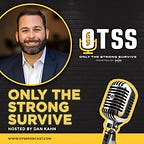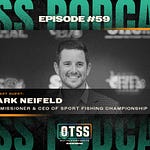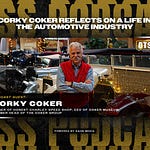On this episode of “Only The Strong Survive,” Kahn Media President & CEO Dan Kahn talks to Azam Rangoonwala. As the CEO of P1 Offshore, Azam’s first experience with the powerboat racing sanctioning body came through his father, who ran the organization. While Azam studied engineering in college, his father wisely suggested that Azam start racing boats. The shrewd move was a long-term plan for Azam to learn the family business from the ground up.
The plan worked as Azam eventually transitioned from racing boats to building them. Along the way, he learned everything about offshore boat racing from a racer’s perspective. He then put that knowledge to good use upon transitioning to a leadership position at P1 Offshore. Coming onboard immediately after a global recession in 2008, Azam quickly had to adapt to new economic realities. His adaptation abilities were tested even further during the pandemic as massive motorsports events ground to a halt. While at the helm of P1 Offshore, Azam has learned a lot about what it takes to run a successful global motorsports brand. Here are our top five takeaways from Dan and Azam’s in-depth discussion:
Harnessing the reach of social media is essential for any brand.
Getting around roadblocks takes creative thinking.
Do what you know best in challenging times.
A connection with consumers is critical for brands.
Delegation is important but can be overdone.
Any Sport Can Now Be Global
Motorsports used to rely heavily on in-person attendance and traditional television coverage. Without either, it was impossible to maintain a healthy series and sponsorships for both racers and sanctioning bodies. Most of this coverage and attendance were regionalized as drawing interest from outside of an area was difficult. However, now, through the power of social media, any sport can find a worldwide audience.
“There is a lot of cool international history (with powerboat racing) that ties together the Middle East, Europe and the U.S.,” said Azam. “One of the things I feel is that we have the opportunity now, especially with globalization the way it is and with social media, livestreaming and connectivity, to launch a sport with a global history and re-ignite it.”
Just Show Up
Acquiring sponsors for any racing series is a lot of hard work. Sometimes, “getting in the door” can be challenging, with many gatekeepers and roadblocks keeping you at bay. One of Azam’s techniques he has developed to get around these is to show up at the headquarters of potential sponsors. While it is definitely a bold move for some, it works more often than not.
“One of my tactics in life is, ‘Hey, I am just close by. Are you around?’” says Azam. “You just keep showing up. So I did that (with Mercury Racing) and managed to get in the door and create a partnership, which was great.”
Build a Connection with Your Brand
One of the most interesting lessons recently from motorsports is the success of Netflix’s “Formula 1: Drive to Survive.” The F1-focused documentary shows that people are more interested in the personalities of a racing team than just the results of a particular race. The same can be said of almost any brand. Connecting to a brand’s personality (or identity) is now just as important for many consumers as the products it produces. Figuring out how to build that connection is vital.
“Formula 1 did an incredible job with that. Drive To Survive made motorsports cool again,” says Azam. “People now understand that it is not just the person in the vehicle but the whole team. It is the whole lifestyle of being part of a motorsports team. It is also who owns that motorsports team and why they are doing it. There are so many elements that Drive To Survive has helped to expose.”
Lean Into What You Are Good at When Times Are Tough
Managing a global motorsports organization is never simple. Global recessions, pandemics and recent economic uncertainty have all thrown major curveballs at Azam. Through it all, he has had to adapt to keep pushing P1 Offshore forward. One of his most significant pieces of advice during economic turbulence or challenging times is to focus on what your brand is good at.
“Because of the current (economic) tide, our thought process now is, rather than focusing on creating a full international championship, we are essentially leaning into what we are good at, which is where we are now,” says Azam. “Let’s focus on the current business, let’s focus on the gate, let’s lean into the actual sport and build our characters that are involved already. Obviously, we want to attract new people and broaden our horizons, but it is easier now to get your neighbors involved than going across the world to attract new people.”
Delegation is a Tricky Process
Any manager knows that delegating tasks is essential for success. Doing so empowers employees to make their own decisions and increases their responsibility. Delegation is also critical to reducing the strain on overloaded individuals and completing tasks. However, delegating too much can be just as detrimental as not delegating enough.
“The mistake I made was when we took the opportunity to restructure the business. I pulled away from a few key areas and managing certain things,” says Azam. “I feel like delegation is a great thing. I took over as CEO in 2017, and I started delegating, and it really worked for me. But I over-delegated and gave away too much. We brought in a new structure and that was a mistake. It is finding that balance between micromanaging and delegation.”












